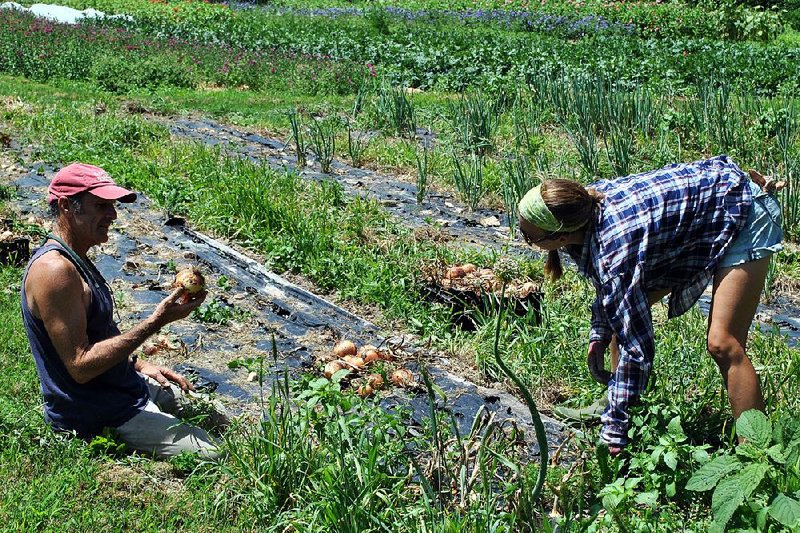HUNTSVILLE -- Organic farming isn't big business in Arkansas, and that's fine by Mark Cain, an organic farmer who has spent more than 30 years in the state.
"You can come out to the country and create a whole 'nother rat race of organic farming, because that's how our society is geared," he said. "But if that isn't your end goal and your end game is the cultivation of yourself and your health and a balanced lifestyle, then it's fulfilling."
Cain and Michael Crane run Dripping Springs Garden in Carroll County, about 50 miles east of Fayetteville. The garden started on a foreclosed blueberry field in 1984. Over the past 30 years, Cain and Crane expanded production to include 30 varieties of vegetables and 60 varieties of flowers.
"It's not a job for the arrogant," Cain said. "Mother Nature wins in the end, no matter what."
Dripping Springs Garden is a certified organic farm -- but that's a rarity even at the Fayetteville Farmers Market, where Cain sells his produce.
Cain said not that many people look for organic products and the certification process involves meticulous record keeping, which few producers are willing to do.
"If people knew what was being sprayed over the stuff that they're eating, they would be way more interested," he said. "They just don't know, and they don't want to know."
Zach Taylor, director of marketing for the Arkansas Department of Agriculture, said the number of organic farms in Arkansas has remained fairly constant over the past few years.
In cooperation with the U.S. Agriculture Department, the state offers a cost-share program where producers can have 75 percent of the organic certification cost reimbursed. The cost of certifications vary. Cain's was about $200.
In 2013, there were 40 certified farms in the state, Taylor said. There were coffee grinders, heifer ranches and pet-food producers on the list. Taylor said most were locally oriented and sold their products at farmers markets.
At Dripping Springs Garden, Cain said interest has remained stable, but he hopes people will seek out organic products more.
"I think about how we got here with this barrage of advertising and selling processed foods," he said. "I just think maybe it's reached a certain point where the pendulum's swinging back a little bit."
Cain, who is 60 years old, said life as an organic farmer has been intense, but worthwhile. He lived in a yurt -- a round, one-room structure traditionally used by nomads in Asia -- for more than 20 years. He also once lived in a tepee in a national forest.
He said it wasn't hard to live in the yurt, but it was hard moving to the house on the property, which was built in 2008. Being outside is everything to Cain.
"It's a rare and lovely thing," he said. "I think that's why for years I didn't want to stay in town overnight to do anything. I just wanted to come home because it's such a rare opportunity in our culture to be able to live like this. It's so quiet. You know, when people are happy at home, they don't feel the need to go out somewhere."
Besides the farmers market, Cain sells to Ozark Natural Foods in Fayetteville and through a community-supported agriculture program where about 40 customers prepay to have vegetables shipped directly to them. A full order of vegetables costs $25 per week.
Cain said as he's grown older, helping others start organic farms has become more important. Dripping Springs has participated in the Multinational Exchange for Sustainable Agriculture for nine years, he said. The exchange is a nonprofit that connects farms with interested workers.
"I think a lot of young people feel swallowed up by hopelessness about environmental conditions and find themselves stuck in urban areas where it's just hard to breathe psychologically," Cain said.
Grace Hockenbeck quit her job as a concierge at a golf course in New Jersey about four years ago to try working on organic farms.
"It was $1 million to join, $25,000 a year on top of that and you would drop over $1,000 every time you went," she said of the golf course. "I was disgusted with it."
Since then, the 28-year-old has worked at nearly 12 farms across the United States. She is working at Dripping Springs Garden this summer with her boyfriend.
"Mark thought it was important that we farm together and work together -- and make sure that we can work together," she said. "We want to have our own farm someday."
SundayMonday Business on 07/06/2014
